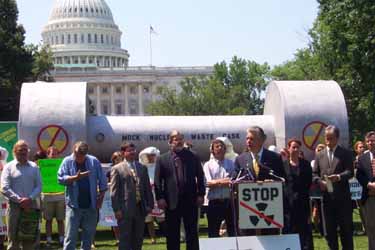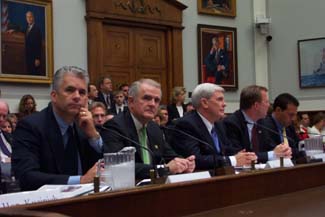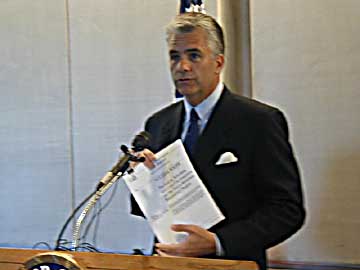Yucca Mountain
Ensign on the Issues
The History
The 1982 Nuclear Waste Policy Act established a national nuclear waste disposal system and gave the Energy Department until 1998 to open a permanent underground repository for high-level nuclear waste. The measure also established the Nuclear Waste Fund, financed by fees imposed on the electricity produced by nuclear utilities, to be used to construct the repository.
By the late 1980s, the Energy Department had narrowed its  search for a permanent site to three western states: Nevada, Washington, and Texas. At the time, the House Speaker was Rep. Jim Wright (D-TX) and the House Majority Leader was Tom Foley (D-WA). When Congress passed the Nuclear Waste Policy Amendments Act in 1987, it directed the Energy Department to study a single site at Yucca Mountain in Nevada as a permanent repository. Equally important, the 1987 Act dropped a requirement of the 1982 law that a second repository be built in the East. The 1987 amendments also directed the Energy Department to develop a temporary repository to store nuclear waste until a permanent site was ready and it barred making Nevada the site of both the permanent and interim facilities.
search for a permanent site to three western states: Nevada, Washington, and Texas. At the time, the House Speaker was Rep. Jim Wright (D-TX) and the House Majority Leader was Tom Foley (D-WA). When Congress passed the Nuclear Waste Policy Amendments Act in 1987, it directed the Energy Department to study a single site at Yucca Mountain in Nevada as a permanent repository. Equally important, the 1987 Act dropped a requirement of the 1982 law that a second repository be built in the East. The 1987 amendments also directed the Energy Department to develop a temporary repository to store nuclear waste until a permanent site was ready and it barred making Nevada the site of both the permanent and interim facilities.
The Nuclear Waste Policy Amendments Act passed the House by a vote of 237-181 and the Senate by a vote of 61-28. Even supporters of the deal conceded that Nevada was a casualty in a raw power play. "We've done it in a purely political process," then-Rep. Al Swift (D-WA) said at the time. "We are going to give somebody some nasty stuff."
During his tenure in the House of Representatives, Senator Ensign played a major role in blocking the interim storage of nuclear waste in Nevada. In 1998, he introduced (and the House passed) H. Res. 379, a resolution to challenge the constitutionality of the Senate-passed nuclear waste bill, S.104, the Nuclear Waste Policy Act of 1997. Called a "blue-slip" resolution, the measure asserted the privilege of the House of Representatives under the Constitution to originate all revenue measures. Since S.104 was deemed to be a revenue measure, his resolution prevented the House from considering the Senate bill.
In the Senate, Sen. Ensign continued to vigorously oppose efforts to move high-level waste to Nevada. Unfortunately, despite a united effort by the Nevada Congressional delegation, the U.S. Senate passed the Yucca Mountain resolution on Tuesday, July 9, 2002. The Senate debated the issue for nearly five hours before voting 60-39 to move to final passage. The Yucca Mountain resolution was adopted by voice vote.
Sen. Ensign focused on his concerns with a senator other than the majority leader bringing legislation to the floor, the dangers of transporting nuclear waste, and other issues related to Yucca Mountain in his statement on the senate floor.
Sen. Ensign knows the fight is not over. He will continue to fight for Nevada to ensure that high-level radioactive waste will not cross our borders. He strongly believes that transporting nuclear waste across the nation and burying it in the side of a mountain is a potential disaster that will costs taxpayers enormously and waste a valuable resource.
What is the Alternative to Yucca Mountain?
One of the greatest environmental challenges our nation faces is what to do with the 40,000 tons of high-level nuclear waste already produced by U.S. nuclear power plants and what to do with the waste which will continue to be produced in the future. It has been estimated that, by the year 2015, the United States will have well over 70,000 tons of spent nuclear fuel containing more than 500 tons of weapons-usable plutonium.
Nuclear waste is one of the deadliest substances known to man, and our nation needs to find a long-term solution that will protect the American people, our land, and our water from its harmful effects. Senator Ensign believes that we need to invest in recycling technology in order for the waste to be stored with adequate safety. We recycle plastics, glass, and paper products. Why not nuclear waste?
A potentially viable option to "recycle" nuclear waste is Accelerator-driven Transmutation of Waste (ATW). Simply put, ATW transforms long-lived  radioactive products into less hazardous materials and generates electricity as a byproduct. Unlike reprocessing of waste, ATW does not produce weapons-grade material as a byproduct. And recycling technology has a number of advantages over burying high-level nuclear waste.
radioactive products into less hazardous materials and generates electricity as a byproduct. Unlike reprocessing of waste, ATW does not produce weapons-grade material as a byproduct. And recycling technology has a number of advantages over burying high-level nuclear waste.
The waste that remains after completing this ATW recycling process is harmful for a dramatically shorter time than the unrecycled material. The residual activity and radiotoxicity of waste in the repository following the ATW process after 300 years would be less than that for a non-assisted repository after 100,000 years. We know that we can build a repository that will be safe for 300 years. It is not believable to suggest that we are certain that Yucca Mountain will prove safe for 100,000 years as truly needed.
Even the advocates for transporting nuclear waste through 43 states to Nevada admit that around the time Yucca Mountain could begin accepting the waste, our country will have produced enough waste to fill it. However, if we recycle the 70,000 tons of high-level nuclear waste requiring storage in 2015, ATW would leave roughly only 3,000 tons requiring high-level storage in a repository. Plus, the waste could be stored more densely because transmuted waste cannot start a nuclear reaction. That means that volume requirements of a repository would be further reduced.
Our nation needs to develop new clean energy sources. Recycling nuclear waste would produce around five trillion kilowatt hours of emissions-free energy over 40 years. With offsetting revenue from electricity sales, the project could nearly pay for itself, making it more cost effective than storage at Yucca Mountain. Yucca Mountain is currently projected to cost $57.5 billion. Instead of spending it on a hole in a mountain, Sen. Ensign advocates taking that money and using it for research and development of recycling technology. 
The Department of Energy's own scientists from Argonne National Laboratory have come up with a way to recycle nuclear waste called pyroprocessing. And a scientist from Los Alamos in New Mexico agreed that process is possible. All possible ways to recycle spent nuclear fuel must be explored. The government should not pick winners when looking for an alternative to burying nuclear waste.
Nuclear waste is going to be a valuable resource. Sen. Ensign believes it should be kept in dry cask storage on the site of nuclear reactors. It will be safe there for 100 years, plenty of time to find a viable alternative by developing recycling facilities. It is well worth the cost and effort to turn one of the most toxic substances into a clean energy alternative.